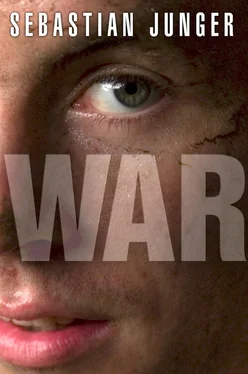As for a sense of purpose, combat is it — the only game in town. Almost none of the things that make life feel worth living back home are present at Restrepo, so the entire range of a young man’s self-worth has to be found within the ragged choreography of a firefight. The men talk about it and dream about it and rehearse for it and analyze it afterward but never plumb its depths enough to lose interest. It’s the ultimate test, and some of the men worry they’ll never again be satisfied with a “normal life” — whatever that is — after the amount of combat they’ve been in. They worry that they may have been ruined for anything else.
“I like the firefights,” O’Byrne admitted to me once. We’d been talking about going home and whether he was going to get bored. “I know,” he added, probably realizing how that sounded. “Saddest thing in the world.”
We walk the steep hill from the KOP up to OP 1 at the end of the day, kicking through patches of crusty snow near the top and sweating heavily in our winter clothes. I’m with Lieutenant Steve Gillespie, the former leader of Third Platoon who has been switched to Second Platoon after a group of his soldiers were caught drinking at the KOP. (Family members were sending them care packages with bottles of mouthwash filled with vodka.) The switch wasn’t punishment so much as an attempt to shake things up. The men at the outpost are dirty and unshaved and have been freezing up there quietly since they ran out of heating oil a week ago. In summer the post is overrun with camel spiders and scorpions but now it’s just cold and silent and lifeless, four men with nothing to do but stare at the mountains and recalculate how much of the deployment they still have left.
A patrol comes in from Obenau with a detainee who is dressed in nothing but a thin cotton shalwar kameez. He’s shaking with cold but for some reason keeps looking around and laughing. Maybe he can’t believe how rough the Americans are living. The patrol takes him on down to the KOP and we continue on the high trail to Restrepo with the wind picking up at the end of the day and monkeys screaming their outrage from the peaks. We don’t bother running the last stretch of road because there hasn’t been any shooting in the valley in weeks, and with snow-covered mountains all around us it’s hard not to think we’re just on some weird camping trip. Restrepo now has plywood bee huts fastened crookedly to the mountainside and a guard tower with a Mark 19 in it and a tiny two-man outpost a hundred yards outside the wire. The outpost is called Columbus and covers the draw below Restrepo. An all-out attack would probably take Columbus without difficulty, but the position would buy the men at Restrepo enough time to grab their guns and roll out the door.
We walk into Restrepo and drop our packs in a pile. The sun has fired the Abas Ghar with a red glow and a few of the brighter planets are already infiltrating the afternoon sky. The men are standing around in dirty fleeces and their pants unbelted smoking cigarettes and watching another day come to an end. They’re dirty in their pores and under their nails and their skin has burnished to a kind of sheen at the wrists and neck where the uniforms rub. Dirt collects in the creases of the skin and shows up as strange webs at the corners of the eyes and their lifelines run black and unmistakable across the palms of their hands. It’s a camp of homeless men or hunters who have not reckoned with a woman in months and long since abandoned the niceties. They belch and fart and blow their noses on their sleeves and wipe their mouths on their shirtfronts and pack every sentence with enough profanity to last most civilians a week. After the fighting ended last fall they got so bored that they started prying boulders out of the hillside and rolling them into the valley. They were trying to get one inside the wire at Firebase Phoenix just to keep Third Platoon on their toes. Caldwell finally told them to knock it off.
Gillespie takes command immediately. Patterson, the platoon sergeant, delivers a short, sharp speech making it clear that the problems with Third Platoon are no reflection on Gillespie and then hands it over to him. Everything about Gillespie is long: his torso, his legs, his neck, and he’s slightly pigeon-toed in a way that belies how tough he really is. Now he stands that way, lanky and awkward, in the dying gray light, taking command of arguably the most combat-intensive outpost in the entire U.S. military. “I’ve been down there with Third Platoon for the past five months so you guys have probably been seeing me around,” he says. “Pretty laid-back guy, like Sergeant Patterson says. I’ll watch you guys and we’ll go from there. You guys got any questions for me?”
Jones raises his hand. There’s a strange expectation in the air, the men seem to be trying to not catch each other’s eyes. Gillespie has his hands jammed into his pockets so there’s nothing he could possibly do about what’s about to happen. “You ever seen the movie Blood In Blood Out , sir?” Jones asks.
Pause.
“Get him!” someone yells, and First Lieutenant Steve Gillespie disappears beneath a scrum of enlisted men. They quickly rack him out on the ground, pull up his shirt, and take turns smacking his abdomen as hard as they can. Donoho spits on his palm first so it will hurt more. Every man takes a turn and Patterson is offered a hit, though he declines, and then they help Gillespie back to his feet. Glasses askew, he slaps the dirt off himself and shakes his head, trying to laugh. I’ve just watched an officer in the U.S. military get overpowered and beaten by his men at a remote outpost in Afghanistan, and it occurs to me that not only is this not happening in other armies, it probably isn’t even happening at other outposts . The previous fall, O’Byrne and Sergeant Mac were trying to figure out how to welcome someone back after leave and the only thing they could think of was to beat the shit out of him, which is what they did. That started a tradition that even other platoons in Battle Company weren’t interested in emulating. “The guys I love the most I beat the worst,” O’Byrne explained. “It’s a sign of affection in the weirdest possible way. It’s the hard way, that’s what it is. They beat Lieutenant Piosa down so badly his face looked like he was getting tortured.”
Gillespie was taking command of Second Platoon and it prompted a lot of talk up on the hill; it was serious business up here and the men knew a bad leader could easily get them killed. They weren’t that familiar with Gillespie beyond the fact that he bore a passing resemblance to Napoleon Dynamite, and a collective decision was made that fell so far outside of Army protocol no one even wanted to claim ownership of it. “Third Platoon wasn’t doing so hot,” O’Byrne told me months later, “so we had our doubts already — you know? So we said, ‘We’re going to beat the shit out of him and if he doesn’t take it, well fuck it — then we just won’t listen to the motherfucker. If he can’t take a beating then he’s not part of Second Platoon anyway. He’s not part of what we’re about.’”
It was a lot of tough talk but the truth was that the men respected Gillespie enormously, and roughing him up was their way of demonstrating that. A lesser officer would never have rolled with that situation, and lesser troops would never have even thought of it. It was about brotherhood, not discipline, and the command was smart enough to understand that and stay out of the way. “Man’s natural instinct is to survive,” Kearney said about Second Platoon. (Tim had just asked him whether they had “demons.”) “The boys don’t go out there and fight for freedom, they don’t fight for patriotism — they fight because they know that if they go out there alone and walk into Aliabad they’re going to get killed.”
Читать дальше
Конец ознакомительного отрывка
Купить книгу












